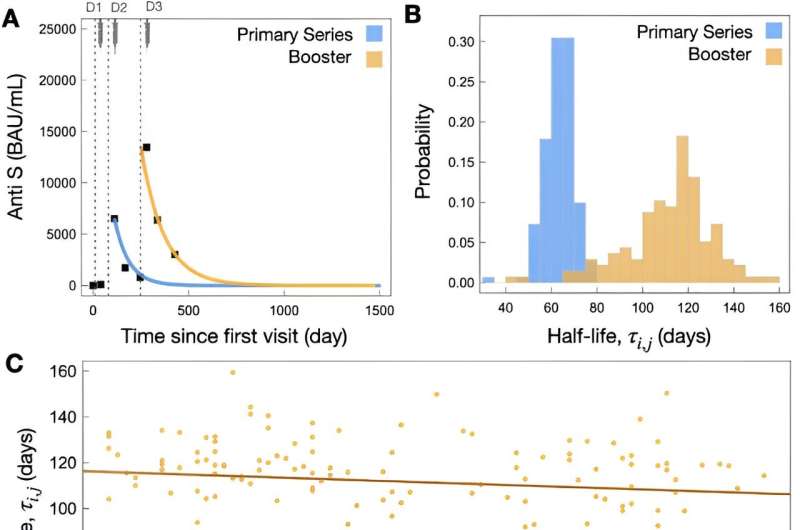This article has been reviewed according to Science X's editorial process and policies. Editors have highlighted the following attributes while ensuring the content's credibility:
fact-checked
peer-reviewed publication
trusted source
proofread
COVID-19 booster immunity lasts much longer than primary series alone, study shows

Thinking about getting a spring-time booster shot? A new study coming out of York University's Centre for Disease Modelling in the Faculty of Science shows that immunity after a COVID-19 booster lasts much longer than the primary series alone. These findings are among other—sometimes "unintuitive"—revelations of how factors like age, sex and comorbidities do and don't affect immune response.
The work is published in the journal Scientific Reports.
The study's authors—York Post Doctoral researchers Chapin Korosec and David Dick, Applied Mathematics Professor Iain Moyles and Professor James Watmough with the University of New Brunswick—used health data submitted to the COVID Immunity Task-Force project for more than 150 individuals who received either Pfizer-BioNTech or Moderna COVID-19 vaccines to look at how immunity holds up over time.
"Our approach as mathematicians is to create mathematical models of the immune system, and then calibrate those models to health care data in order to advance our understanding of the human immune system. It was really interesting to see the SARS-CoV-2 booster dose have such a huge increase in protective longevity capacity as compared to the primary series of two doses," says Korosec, the study's lead author.
The study used Canadian vaccine data collected from individuals living in long-term care, as well as frontline health-care workers working in long-term care and hospitals.
Looking at the group as a whole, the median length for the antibody half-life immune response was 63 days for the primary series, and increased to 115 days for those who went on to receive their boosters, a statistically significant finding, says Korosec.
It is well-established that age can affect how adept the body is at priming an immune response after vaccines, so much so that advanced age is considered a comorbidity itself, says Korosec.
"Chronological age is your time since birth. But you also have an immunological age, which is correlated to your chronological age, and is related to how your body loses its ability to prime against invading pathogens and produce antibodies as time marches on," explains Korosec. "What's convoluted is that as we age chronologically, the probability that we accrue diseases that can affect the immune system in unintuitive ways also increases."
Looking into this aspect, the researchers found that older adults did have a less long-lasting immune response, but once they controlled for other comorbidities such as hypertension, lung disease and cancer, age no longer had as significant of an influence on the immune response.
Other interesting findings include a small, but statistically significant immune response for males versus females, and people with asthma having a longer lasting immune response—more durable, in fact, than those with hybrid immunity from vaccines and contracting COVID-19.
"We found that some outcomes were surprising and worth further study, but of course we're not advocating any particular comorbidity is beneficial," says Dick. "We don't have any information from this study on how asthma would affect the severity of the COVID-19 illness, for example."
Outside of the strict findings, the researchers also say the study points to the importance of interdisciplinary research and are excited about the possibilities for collaboration, with plans to open York's medical school in 2028.
"While we're all from math and stats departments, the data comes from clinicians who went through medical school and are now professors studying immunology, and I think this study shows how people with different skill sets can come together and do really interesting science," says Korosec.
Moyles adds, "We have a really top applied math program at York, and now the university has announced a medical school. Imagine these clinicians were at York and we had access to the data on the ground floor. This would cut the research timeline by years and has huge potential for future interdisciplinary research at the university."
More information: Chapin S. Korosec et al, SARS-CoV-2 booster vaccine dose significantly extends humoral immune response half-life beyond the primary series, Scientific Reports (2024). DOI: 10.1038/s41598-024-58811-3



















